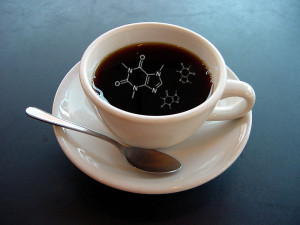
Image from Wikipedia with slight modifications
Most coffee-particular people already know that the quality of the water you use is important for good coffee, but a recent paper describes how affecting the specific hard mineral content can have important changes in the relative extraction of specific flavor and strength affecting chemicals in your brew. We discuss the basics of coffee preparation, and the conclusions of the paper.
1:15 Greg throws out a Leeroy Jenkins reference right off the bat. (I guess wait for episode 32.33?)
2:00 the article that prompted this show was “A Chemist Has Uncovered A Secret To Brewing Delicious Coffee At Home” published in Business Insider on Jun 5th, 2014.
2:45 The paper is called “The Role of Dissolved Cations in Coffee Extraction”, by Christopher H. Hendon, Lesley Colonna-Dashwood, and Maxwell Colonna-Dashwood, published in the Journal of Agricultural and Food Chemistry.
3:50 The researcher identified seven chemicals important to the flavor and strength of coffee, and used density functional theory to calculate the bonding energy between these chemicals and common ions in water that contribute to water hardness.
6:45 one of the chemicals present in Coffee, eugenol, is also present in whisky and other barrel-aged liquors.
16:00 It might be useful to suggest to coffee brewers to use distilled or reverse osmosis water and then add something similar to these brewing salts to the water to facilitate extraction!
18:10 The paper only talks about water with Total Dissolved Solids (TDS) of <300 ppm, which is standard for municipal water supplies, but well or ground water in areas (like our own Phoenix area) can have much more calcium hardness than that.
Links to the music used in this week’s episode:
Intro: Intro – Crying (Return to Olde World)
Outro: Dreams are Maps – The Wild (Dreams are Maps)
Podcast: Play in new window | Download
Subscribe: Apple Podcasts | RSS







0 Responses
Stay in touch with the conversation, subscribe to the RSS feed for comments on this post.